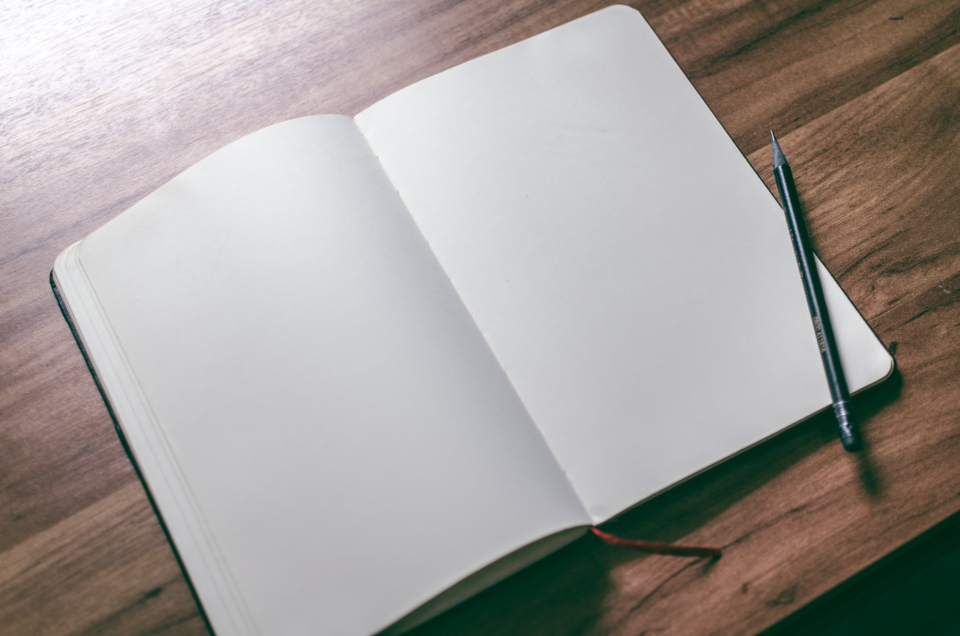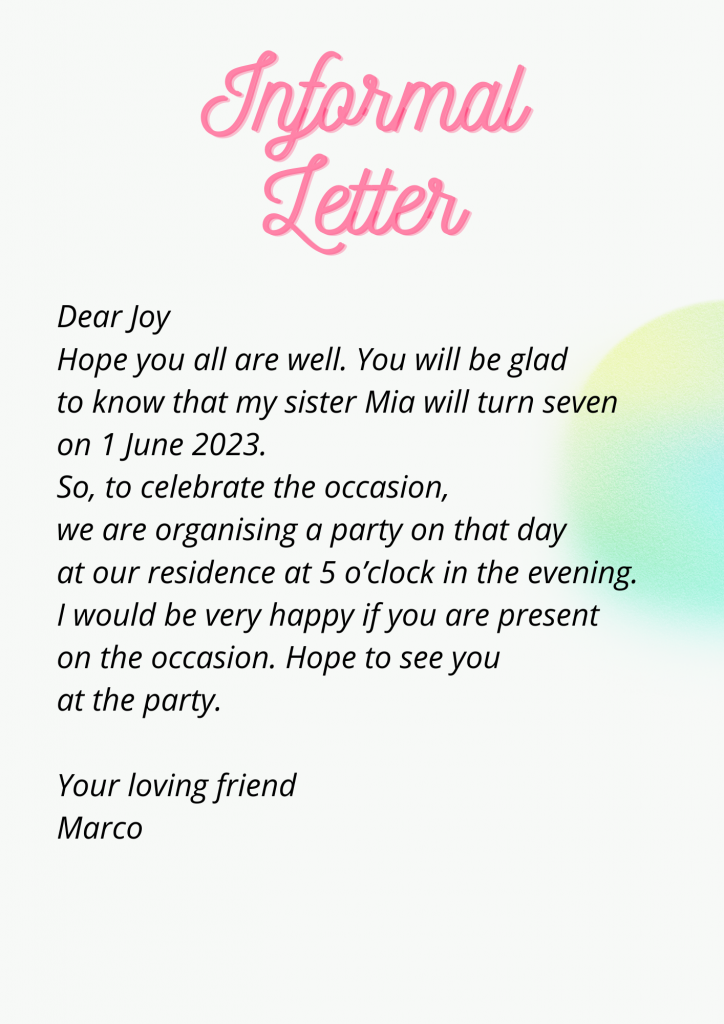Last updated on March 15, 2023
Informal letters don’t usually include standard phrases and formulations. Here we give some examples of an informal letter opening, body, and conclusion.
[lwptoc depth=”1″ width=”full” backgroundColor=”#f7f7f7″ borderColor=”#1b95ad”]
What Is an Informal Letter?
Let us begin by defining what an “informal letter” is, as it will help us to guide you through the process of writing one. Informal letters are personal letters that people typically write to family members, significant others, and friends. In other words, it’s the kind of letter that you write to someone that you’re familiar with or that you don’t feel that you need to use formal language with. Most informal letters do not require the use of complicated sentences. They are written using casual, personal language. With an informal letter you might attempt to tell someone about what is happening in your life, perhaps you’re sharing gossip, congratulating someone, apologizing to someone, or even telling someone your deep and intimate feelings about them.
Structure of an Informal Letter
First of all, any informal letter opening should start with a greeting. If you do not know the name of the addressee, use “Dear Sir” or “Dear Madame.” If you know the name of the addressee and are in the working relationship: write “Dear Dr. Davidson” (Dr. = Doctor)! If this is your friend: “Dear Andrew” is a good template!
Final wording
Formal:
- Yours faithfully,
- Regards,
Less formal:
- Sincerely yours,
- Yours sincerely
Beginning Phrases
- Thank you for your letter about …
- In response to your letter about …
- As to your request…
Paper Letter or Email?
Nowadays, many people choose to communicate via email and instant messaging. Surely, many of you already feel nostalgia for paper letters. We may feel nostalgia for the feelings that accompanied us when we thoughtfully and diligently wrote interesting and witty letters.
Modern technologies and social networks have changed our reality, because now a student can communicate with a person of another culture in his or her language. Children have lost the feelings that we experienced when writing a letter by hand.
Of course, electronic messages are effective, because sending and receiving them are instantaneous. In business, words have become abbreviations: in everyday communication we often use abbreviations, and paper and pen gradually disappear from our everyday life.
Fortunately, letters are still an integral part of language exams. Because of this, we should consider two types of writing – formal and informal. When writing a letter, it is important to remember who will read it (friend, family member, or potential employer), the main topics that you want to describe, how to start an informal letter in English, and any other information that you think the reader should learn. We will analyze the writing of unofficial letters.
Steps for Writing an Informal Letter
Do you know how to start an informal letter in English? First we need to look at the format and style of writing an informal letter. In its design, we use abbreviated forms of verbs (I’m, I’ll, etc.). Suggestions and questions should be short and simple, and it is also better to use simple schemes of connections between them.
Some simple schemes:
- “But”
- “Because”
- “Also”
- “Then”
- “However”.
Your address in the letter should be written on the upper right of the page with a date right under it. By skipping a line, the greeting starts on the left side of the page. As a rule, it starts with “Dear …” or “Hi …” after which a comma is not put.
The next paragraph is the beginning of the letter itself – it needs to be written with a small indent to the right. Here it is necessary to refer to the person you are writing to: “It was great to hear from you” or “Thank you for your letter, it was lovely to hear from you.” You can also comment on the reason why you wrote. For example, if the person who wrote you told you that he received a promotion or passed a very important test, you should congratulate him or her on this: “Well done on passing your test / getting that promotion.”
In the second paragraph you can write the answers to those questions that you may have asked in a letter – say, a request for an opinion or advice.
- These expressions are often used to justify opinions:
- “In my opinion …”
- “It’s my belief that …”
- “I definitely think that …”
- These expressions are used to provide advice or suggestions:
- “If I were you I would ….”
- “Why not try…”
- “I suggest that …”
- “You should perhaps …”
In turn, you can follow up with a few questions – for example, find out about something in more detail, or write about what is happening in your life. Having stated everything that you wanted, let the reader know that your letter is coming to an end. You can use phrases like:
- “I look forward to hearing back from you soon.”
- “Hope to hear from you soon.”
- “Keep in touch.”
When you finish the letter, you can subscribe differently, of course, taking into account the personality of the person you are addressing. Here are a few examples:
- “Best Wishes”
- “Sincerely (yours)”
- “(Lots of) Love”
- “(Best) Regards”
People have written letters to each other from time immemorial. By letters you can judge the character of a person, his or her education, hobbies, and most importantly – how well he or she knows the language. Those who learn the language sooner or later will face the need to learn how to write letters in English correctly.
A letter may be needed when applying to a higher educational institution abroad, when passing a language examination, or when applying for a job. But not only in the world of business communication it is important to know how to write a letter in English. Informal correspondence can also affect your life, which is communication with friends and acquaintances. According to your letters, those who read them will judge you. Do you want to leave a pleasant impression of yourself? Keep in mind that repeating the rules of writing the address in English is important. Before you start writing a letter, you need to determine for what purpose you are doing it, and therefore – to determine the type of letter.
All letters can be divided into personal and business letters. Are there general strict rules for writing letters in English? If we are talking about personal correspondence, the answer is obvious – no. Templates of letters in English are often used in business documents, in communication with business partners. Personal correspondence is your own business. And yet, there are some tips that will help make the correspondence more enjoyable for you and the person with whom you are conducting an epistolary conversation. In addition, if you are a beginner in the world of English, you should try to write the first letters using templates. Of course, stream of consciousness is a good thing, but only in Joyce’s literary works.
If you like this post, also Learn How to Write an Informal Letter in 15 Minutes.
FAQ on Writing an Informal Letter in English
We decided to collect answers from professional writers to some of the most frequently asked questions from students regarding informal letters.
What are the types of informal letters?
Since informal letters are written on different occasions, the main difference between them is the purpose of the letter. Here are some of the reasons why someone might choose to write an informal letter:
- Thank you letter – if someone has done something that you highly appreciate or that perhaps made a big difference in your life, you might choose to send them a letter to say “thank you.”
- Share gossip – communication with friends via letters to share the latest news on your life and the lives of people you know.
- Wishing well – you can write an informal letter to a person to wish them well on a special occasion such as a wedding, birthday, promotion, etc.
- Sending apologies – in certain occasions when a misunderstanding happens or when you’ve made a mistake that did harm to someone, you can send an informal letter to try to explain and apologize for what you did.
- Invitation letter – a letter you write to invite people to a meaningful occasion, for example, your birthday party or your wedding.
2. What can I write in an informal letter in English?
It all will depend on the letter type and the occasion. For example, you can ask how your friend is doing or congratulate him or her on something. Make the tone of voice comforting, friendly, and casual. There’s no need to use formal language.
3. What is the first thing to write in an informal letter?
Start with the name of the person. Some informal letters start with your address at the top of the page.
Informal Essay Writing Assistance from the Experts
P.S. Dear reader, here is a gentle reminder for you about our writing help services. You can receive qualified assistance with any kind of writing task by requesting write my essay. Getting our help is the best way to resolve your writing issues. Our authors are there for you, ready to write your informal and formal letters, essays, term papers, speeches, research papers, capstone projects, etc., on request.



A letter to my father
To get help with the letter writing, place an order on our site https://writemyessayonline.com/